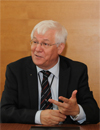 |
||
|
Chernobyl Radiation Shield Under Threat Amid Ukraine Crisis RIA Novosti, PUBLISHED 24.04.2014 The construction of a contamination shield at the damaged Chernobyl nuclear power plant could be delayed amid the ongoing political crisis in the country, the CEO of aid agency Chernobyl Children International (CCI) told the Irish Independent. “What can never be forgotten is that the destruction caused by the deadly explosion at Reactor Number 4 at Chernobyl was triggered by the release of just 3 percent of the radioactive material in the plant, the remaining 97 percent of this enormous ticking time bomb of highly unstable nuclear material is still inside the crumbling Chernobyl complex,” Adi Roche said. Workers built a temporary shield over the damaged reactor soon after the disaster, called a sarcophagus. In 2010, work on the new shied started. The primary aim of the project, estimated to cost nearly €1.5 billion, is to prevent further leakage at the crippled reactor. Topics: East Europe, Ukraine Other news: Hungary Enacts Law to Expand Nuclear Power With Russian Aid Hungary’s president has signed a bill into law to expand a nuclear power plant in the country with Russian assistance. Hungary Lawmakers OK Russia Nuclear Plant Deal Russia will provide Hungary a loan of up to 10 billion euros ($13.5 billion) - around 80 percent of construction costs. Russia to Lend Hungary $13.7Bln for Nuclear Plant The deal was announced during a state visit to Moscow by Hungarian Prime Minister Viktor Orban and was hailed by Russian President Vladimir Putin. Last news:
|
Hero of the day 
We are currently working with the Nuclear Decommissioning Authority (NDA) on this approach, which was submitted in response to their February 2012 call for alternative proposals. We appreciate that the UK is in the early stages of their policy development activities and are pleased to be involved in such important work. INTERVIEW
Yanko Yanev OPINION
Joint Plan of Action |
Licence Р В Р’ВВР В Р’В» №ФС77-30792. ATOMINFO™ trademark.

